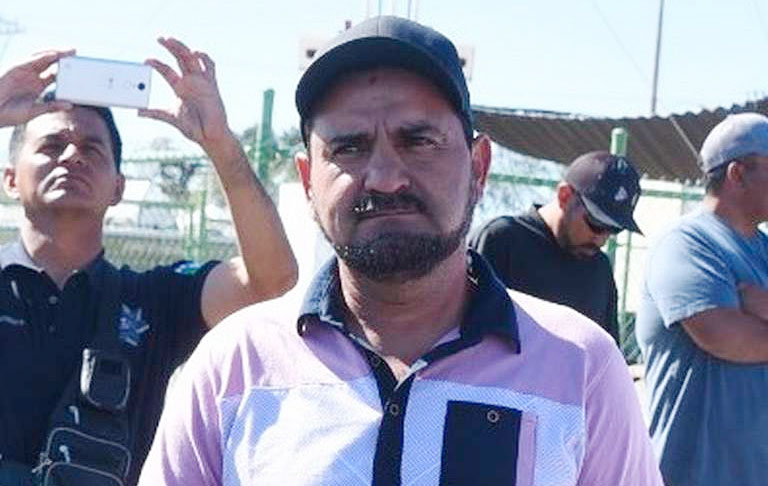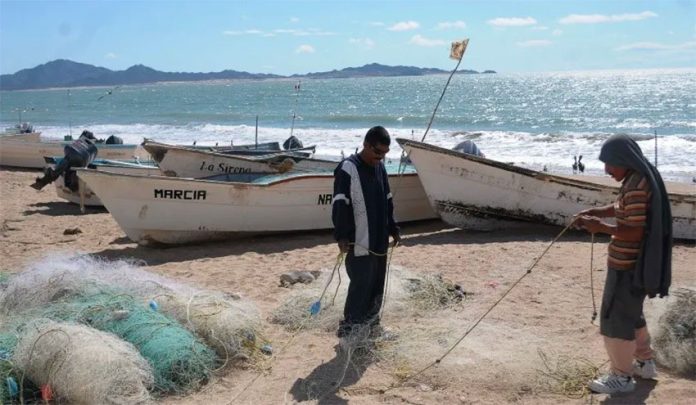Fishermen are defying rules designed to protect the critically endangered vaquita marina porpoise as the new shrimp season begins in the upper Gulf of California.
The federal government this week enlarged by 50% a zero-tolerance zone in the gulf’s northern region where the use of a range of fishing nets including gillnets are prohibited.
The vaquitas, of which fewer than 10 are thought to exist, are prone to becoming entangled in fishing nets and drowning.
One of the banned nets is called a chinchorro de línea, which is commonly used to catch shrimp.
But according to the head of a fishermen’s federation in San Felipe, Baja California, shrimpers used that net on Friday despite the ban and the fact that the closed season on shrimp fishing remained in effect until Saturday.
Lorenzo García said that officials with the environmental protection agency Profepa and the National Aquaculture and Fisheries Commission as well as marines tried to persuade shrimp fishermen not to go to sea but didn’t threaten to impose sanctions on them.
He said authorities want shrimpers to use a net known as a chango ecológico but claimed that they are in fact more dangerous to the vaquita marina than the nets they are currently using.
“The chinchorro is more selective, there is no evidence that it has trapped a vaquita marina but the chango takes everything, everything that goes by,” García said.
He said that fishermen will continue to use the chinchorro but stressed that they are not encroaching on the zero-tolerance zone, which has been increased to 225 square kilometers from 150.
“We’re just looking for a way to keep working,” García said.
He said that fishermen are open to different ways of fishing but asserted that the alternatives currently on the table are not viable.

He also said that he and other fishing association leaders are trying to reach an agreement with the government that will prevent clashes between fishermen and the authorities, as have previously occurred.
“We’re doing our best to stop that but when people get inflamed, we just have to step out of the way,” García said.
He acknowledged that there is pressure from the United States to do more to protect the vaquita, noting that the U.S. has placed a ban on the import of shrimp caught in the upper Gulf of California.
But he said shrimpers will continue to fish there because they have no other way to support their families. García said the government has ignored fishermen’s pleas for financial support.
They used to receive money from the government to compensate them for lost income due to fishing bans designed to protect the vaquita but they became unreliable late in the term of former president Enrique Peña Nieto and dried up completely when President López Obrador took office in late 2018.
García complained that the government is more focused on putting restrictions on legal fishing than eliminating illegal fishing of the totoaba, a species of fish that is extremely lucrative because their swim bladders are considered a delicacy in China.
The gillnets used to catch totoaba are especially dangerous to vaquitas. Authorities in conjunction with non-governmental environmental groups carry out patrols to look for totoaba poachers and their nets but enforcement has been lax.
The federal government said this week that authorities will carry out sea and air patrols around the clock to ensure compliance with the new rules in the zero tolerance area but whether that actually happens remains to be seen.
Baja California Governor Diego Bonilla said state authorities are in a tricky situation with regard to whether they should strictly enforce the fishing gear rules or not.
“We’re between a rock and a hard place, … if we don’t let them fish, how are they going to eat? If we let them fish and their gear affects the vaquita, that’s also a problem,” he said.
The governor claimed that the federal government has abandoned upper Gulf of California fishermen and asserted that it is partly to blame for the vaquita marina being so close to extinction.
“The federal government … has to tell them honestly why it hasn’t placed due attention on the issue of preserving the vaquita marina,” Bonilla said, adding that the fishermen’s right to earn a living must be protected.
Source: El Imparcial (sp), Fronteras (en)
